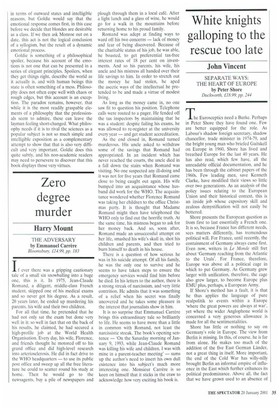Zero degree murder
Harry Mount
THE ADVERSARY by Emmanuel Carri're Bloomsbury, i'14.99, pp. 183 If ever there was a gripping cautionary tale of a small sin snowballing into a huge one, this is it. In 1975, Jean-Claude Romand, a diligent, middle-class French student, skipped one of his medical exams and so never got his degree. As a result, 20 years later, he ended up murdering his parents, his wife and their two children.
For all that time, he pretended that he had not only sat the exam but done very well in it: so well in fact that on the back of his results, he claimed, he had secured a high-profile job at the World Health Organisation. Every day, his wife, Florence, and friends thought he motored off to his grand office and did high-level research into arteriosclerosis. He did in fact drive to the WHO headquarters — to use its public post office and sweep up all the free literature he could to scatter round his study at home. Then he would go to the newsagents, buy a pile of newspapers and
plough through them in a local café. After a light lunch and a glass of wine, he would go for a walk in the mountains before returning home to his proud family.
Romand was adept at finding ways to ward off his two concerns — lack of money and fear of being discovered. Because of the charitable status of his job, he was able, he boasted, to get preferential tax-free interest rates of 18 per cent on investments. And so his parents, his wife, his uncle and his mistress all handed over their life savings to him. In order to stretch out the money he had stolen, he aped the ascetic ways of the intellectual he pretended to be and made a virtue of modest living.
As long as the money came in, no one saw fit to question his position. Telephone calls were routed to a pager. He fended off the tax inspectors by maintaining that he was a student: despite failing his exams, he was allowed to re-register at the university every year — and get student accreditation.
As the end closed in, Romand turned murderous. His uncle asked to withdraw some of the savings that Romand had appropriated. In an incident which has never reached the courts, the uncle died in a fall down the stairs when Romand was visiting. No one suspected any ill-doing and it was not for five years that Romand came close to being caught out again. His wife bumped into an acquaintance whose husband did work for the WHO. The acquaintance wondered whether Florence Romand was taking her children to the office Christmas party. It is thought that Madame Romand might then have telephoned the WHO only to find out the horrific truth. At the same time, his mistress began to ask for her money back. And so, soon after, Romand made an unsuccessful attempt on her life, smashed his wife's skull in, shot his children and parents, and then tried to burn himself to death in his house.
There is a question of how serious he was in his suicide attempt. Of all his family, he was the only one to survive and he seems to have taken steps to ensure the emergency services would find him before he died. In his letters to the author, there is a strong streak of narcissism, and very little contrition. He admits that it was something of a relief when his secret was finally uncovered and he takes some pleasure in the interest that journalists show in him.
It is no surprise that Emmanuel Carrere brings this extraordinary tale so brilliantly to life. He seems to have more than a little in common with Romand, not least the narcissistic streak. The book's opening sentence — On the Saturday morning of January 9, 1993, while Jean-Claude Romand was killing his wife and children, I was with mine in a parent-teacher meeting' — sums up the author's need to insert his own dull existence into his subject's much more interesting one. Monsieur Carrere is so keen on himself that it sticks in the craw to acknowledge how very exciting his book is.






























































 Previous page
Previous page